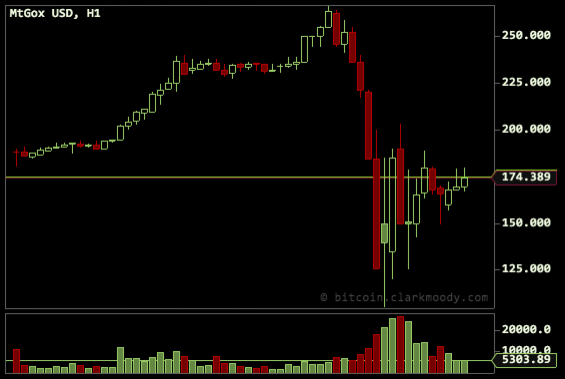Bitcoin Bubble Is Unavoidable And Necessary, Says Trader

The value of the bitcoin has skyrocketed amid a recent flood of capital into the virtual currency, but many are wondering whether its appreciation will hold strong or if it’s a speculation bubble that's ready to burst.
Bitcoins exist only in a digital form and have become an increasingly popular form of direct online payment between two parties secured through encrypted networks. It has also gained wider recognition as an asset for trade and speculation.
Earlier this week, the value of a single bitcoin rose above $200 for the first time, a tenfold increase from its value of $20 at the beginning of the year. It peaked at a high of $266.
On Wednesday, however, the virtually currency's value took a major dip, dropping to a low of $105 before settling at between $150 and $175.
Some view the price swing as a sign that bitcoin’s value has peaked and is beginning to decline, while others see it as a momentary blip in an otherwise upward trend.
Jered Kenna, CEO of the Tradehill Bitcoin exchange in San Francisco, told the International Business Times that bitcoin’s recent appreciation was being driven by an influx of capital from professional investors and currency traders.
“Before, you only had people that were only willing to spend $500 or so, but now you have people that are putting down [as much as] $1 million,” he said.
This indicates that more people are investing in bitcoin as an asset, driving its value up.
Unlike most government-backed currencies such as the U.S. dollar, there is a finite supply of bitcoins that exist in a market without any centralized regulating authority, making it subject to wide price fluctuations -- much like a publicly traded stock.
Bitcoins are bought and traded on various online exchanges with transactions that are carried out directly between two parties through peer-to-peer networks.
In order to purchase bitcoins, a buyer must link their bank account to an exchange service to open up a virtual wallet where bitcoins can be stored online. Alternatively, bitcoins can be stored offline on portable harddrives to provide fruther security against hacking.
First introduced in 2009, there are about 11 million bitcoins now in online circulation. The global supply is set to increase gradually and cap at a firm 21 million by 2140.
Bitcoins are generated through a virtual “mining” process in which complex algorithms must be decoded within the peer-to-peer networks of the bitcoin market. These algorithms require vast amounts of computing power and time to solve and typically require groups of computers working together.
At the moment, it can take as long as three years to mine a mere 25 bitcoins, which at today's rates would be worth less than $4,000. In other words, an individual would most likely spend more money to mine the bitcoins than they are worth. This approach is meant to space out circulation over time and prevent any one person from suddenly accumulating a trove of bitcoins before they’ve entered the market.
Scarcity is a major factor in the bitcoin's value. People who have them tend to hold onto them with the expectation that they could appreciate and then be sold at a profit.
Of course, if there are no people willing to pay higher prices for bitcoins, then a bubble is revealed and begins to burst as more people try to sell off their bitcoins at falling prices.
“For sure, there will be a bubble, but it’s impossible to say if we’re in one right now,” Kenna said. “Some people are going to make a lot of money and some people are going to lose a lot of money.”
Kenna said that the bursting of a bitcoin bubble would be necessary to move it past its use as an asset and on to being an alternate means of paying for goods and services, as it was intended.
From there, Kenna envisions that bitcoin would begin to have greater price stability and could potentially support its own form of a stock exchange.
© Copyright IBTimes 2024. All rights reserved.



















